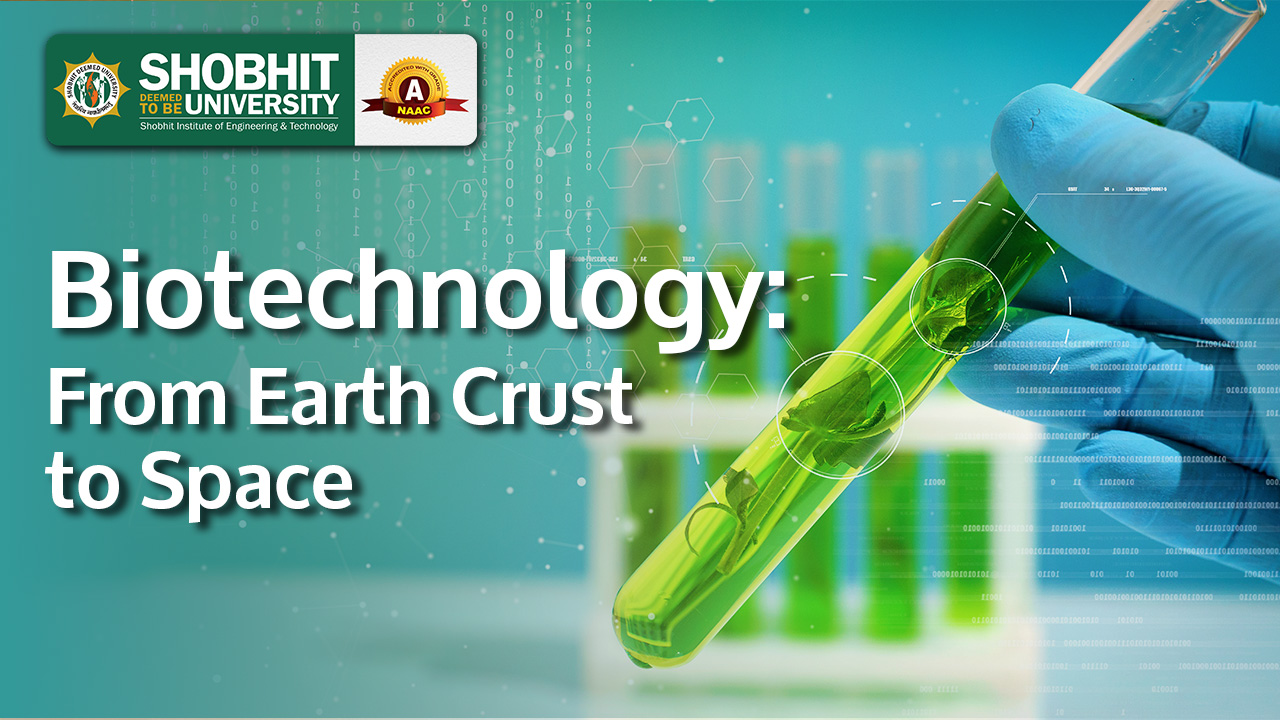
Biotechnology: From Earth’s Crust to Outer Space
From a rudimentary fermentation process used by ancient cultures to a sophisticated science that runs from the Earth's lowermost strata to outer space. Biotechnology is an interdisciplinary subject that merges biology and technology.
Biotechnology is a method of producing technologies that improve the quality of life and preserve the environment by modifying organisms or biological systems. Nowadays, biotechnology is an essential aspect of space exploration and sustainable development due to its wide dynamic uses, which provide solutions not only on planet Earth but also on other planets.
Biotechnology has revolutionized industry, healthcare, agriculture, and environmental conservation on our planet. Food security has been enhanced due to agricultural biotechnology, which has introduced genetically modified food plants that are resistant to insects, diseases, and adverse weather. Biotechnology has also revolutionized the treatment of genetic and long-term diseases in medicine through the production of vaccines, gene therapies, and biopharmaceuticals such as insulin and monoclonal antibodies. Industrial biotechnology significantly reduces its environmental footprint by creating biofuels, biodegradable plastics, and green chemicals through the use of enzymes and microorganisms. Environmental biotechnology is also crucial for bioremediation—utilizing microbes to remove oil spills, purify wastewater, and decontaminate contaminated soil and groundwater, thus restoring ecosystems even in highly degraded environments.
Research and shielding of the Earth's geological layers is another pathetic use of biotechnology. Microorganisms that prosper in resistive underground environments, including deep oil reservoirs are targets of research in microbiology. These extremophiles have practical applications in mining, bioleaching, and carbon sequestration, and also contribute to knowledge about the origin of life. These microorganisms can even contribute to creating sustainable methods for controlling carbon dioxide discharges beneath the earth or recovering metals, illustrating the potential of biotechnology to help counteract climate change and strip Earth's crustal resources.
Biotechnology can become a dominant force in space travel and colonization of the universe beyond Earth. With human missions to Mars and other planets, biotechnology (space biotechnology) will be critical in the development of life systems that depend on biological processes. GEM's and plants will be useful for producing oxygen, recycling wastes, and producing food in outer space bases. A new field of biotechnology known as synthetic biology is enabling the design of customized organisms, which can withstand the extreme conditions of space and perform important functions like radiation resistance, bio manufacturing and even healing materials for spacecraft.
In addition, research into biosignatures in extraterrestrial environments and discovering microbial life elsewhere in the universe are two of the spheres wherein astrobiology, a space science discipline that investigates life outside Earth, largely depends on biotechnological equipment’s. Molecular and genetic techniques are employed by Mars rover and other probe instruments to detect organic molecules, analyse soil samples, and search for evidence of present or past life. The discoveries in this area not only better our understanding of the universality of existence but also help us understand how tough and resilient life is in challenging conditions. Since biotechnology is an interdisciplinary field with a wide-ranging impact, numerous and growing career opportunities exist in this area. Medical biotechnology, agricultural biotechnology, industrial biotechnology, bioinformatics, genomics, proteomics, and synthetic biology are just a few examples of areas where students and professionals can specialize. As space biotechnology unfolds, new careers are being created in collaboration with research institutions, space agencies, and bioengineering firms. Quality analysts, clinical scientists, environmental consultants, patent analysts, bioentrepreneurs, and teachers are some of the career possibilities for biotechnologists.
Besides industry and research, career opportunities have been opened up by regulatory affairs, biosafety, and intellectual property rights (IPR) especially for individuals who are interested in law, ethics, or policy.
Moreover, the establishment of biotech startups provides ample business opportunity for innovative minds to bring about scientific ideas into practical commodities and services.
Conclusion
Biotechnology is a powerful tool driving innovation from the bottom of the Earth's crust to the entire expanse of space, and it is no longer confined to the laboratory or mainstream industries. Biotechnology bridges biology and technology, natural and artificial systems, and life on our planet and possibilities for space exploration. Due to its vast potential to solve some of the most crucial issues haunting mankind, biotechnology offers not only a rosy future for a profession but also a way to shape a greener and pioneering one.
